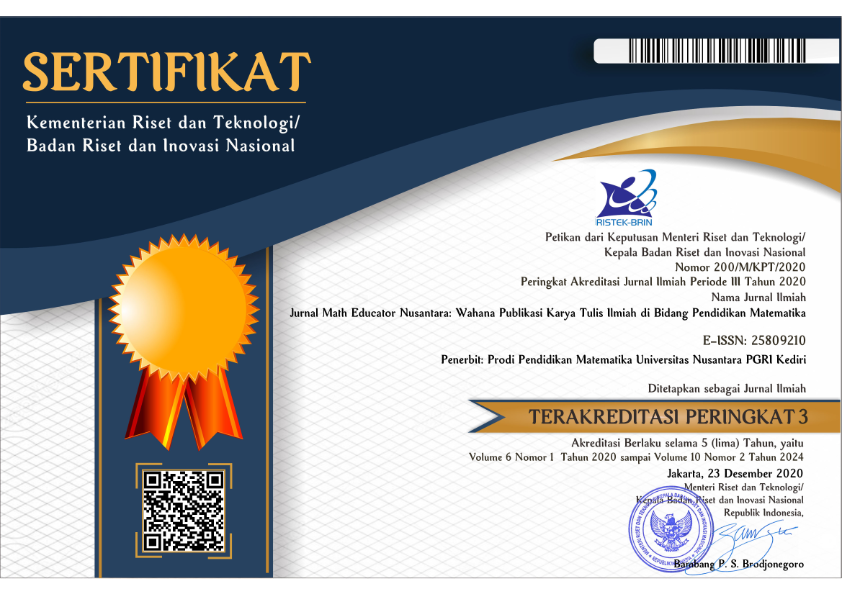Eksperimentasi Model Pembelajaran Problem Based Learning dan Kooperatif Tipe Snowball Throwing Pada Matematika SMPN Se-kabupaten Nganjuk Tahun 2016/2017
DOI:
https://doi.org/10.29407/jmen.v4i01.11974Keywords:
Problem Based Learning, kooperatif tipe Snowball Throwing, prestasi belajarAbstract
Abstrak
Penelitian ini bertujuan untuk mengetahui pengaruh model pembelajaran terhadap prestasi belajar siswa. Model pembelajaran yang dibandingkan adalah PBL dan kooperatif tipe Snowball Throwing. Jenis penelitiannya adalah penelitian kuasi eksperimental dan populasi penelitian ini adalah siswa kelas VIII di Kabupaten Nganjuk pada tahun akademik 2016/2017. Ukuran sampel adalah 68 siswa, yang terambil menggunakan teknik cluster random sampling. Instrumen yang digunakan untuk pengumpulan data adalah tes prestasi matematika. Uji hipotesis menggunakan varian uji rerata z. Hasil penelitian tersebut adalah sebagai berikut. Prestasi belajar matematika yang diajarkan oleh Problem Based Learning dan Snowball Throwing menghasilkan prestasi belajar yang sama.
kata kunci : Problem Based Learning, kooperatif tipe Snowball Throwing dan prestasi belajar.
Abstract
This study aims to determine the effect of learning models on student achievement. The compared learning model is PBL and cooperative type Snowball Throwing. The type of research is quasi experimental research and the population of this research is the students of class VIII in Nganjuk Regency in academic year 2016/2017. The sample size was 68 students, taken with cluster random sampling technique. The instrument used for data collection is a mathematics achievement test. Hypothesis test using the mean test variant z. The results of the study are as follows. Mathematics learning achievement taught by Problem Based Learning and Snowball Throwing resulted in the same learning achievement
keyword : Problem Based Learning, Snowball Throwing and Achievement.
References
Budiyono. 2015. Pengantar Penilaian Hasil Belajar. Surakarta: UNS Press.
Hudojo, H. 2002. Pengembangan Kurikulum Dan Pembelajaran Matematika. Malang: JICA.
Ignacio, N.G., Nieto, L.J.B, and Barona, E.G. 2006. The Affective Domain In Mathematics Learning. International Electronic Journal of Mathematics Education. Vol.1(1): 16-32.
Kupczynski, L., Mundy, M.A., Goswami, J., and Meling, V. 2012. Cooperative Learning In Distance Learning: A Mixed Methods Study. International Journal of Instruction. Vol.5(2): 81-90.
Masek, A. 2012. The Effects Of Problem Based Learning On Knowledge Acquisition, Critical Thinking, And Intrinsic Motivation Of Electrical Engineering Students. Malaysia: Faculty of Technical and Vocational Education Universiti Tun Hussein.
Putri, N.P. 2012. Pengaruh Model Pembelajaran Snowball Throwing Dan Minat Belajar Terhadap Kemampuan Menyimak. Tesis. Surakarta: Universitas Sebelas Maret.
Safa’udin, M. 2015. Eksperimentasi Model Pembelajaran Problem Based Learning Dan Kooperatif Tipe Snowball Throwing Pada Matematika SMPN Sekabupaten Nganjuk. Tesis. Surakarta: Universitas Sebelas Maret.
Santosa, R.A (1956). Pendidikan Masyarakat. Jilid I, II, dan III. Bandung: Ganaco NV.
Sastrawati, Eka., Rusdi, Muhammad dan Syamsurizal. Problem-Based Learning, Strategi Metakognisi dan Keterampilan Berpikir Tingkat Tinggi Siswa. Tekno-Pedagogi Vol. 1 No. 2 September 2011: 1-14
Slavin, R. E. 1995. Cooperative Learning, Theory and Practice 4th edition. Allyn an Bacon Publishers.
UU Nomor 20 tahun 2003. Bab I Pasal Ayat 20 tentang Sisdiknas.
Downloads
Published
Issue
Section
License
Authors who publish with this journal agree to the following terms:
- Copyright on any article is retained by the author(s).
- The author grants the journal, the right of first publication with the work simultaneously licensed under a Creative Commons Attribution License that allows others to share the work with an acknowledgment of the work’s authorship and initial publication in this journal.
- Authors are able to enter into separate, additional contractual arrangements for the non-exclusive distribution of the journal’s published version of the work (e.g., post it to an institutional repository or publish it in a book), with an acknowledgment of its initial publication in this journal.
- Authors are permitted and encouraged to post their work online (e.g., in institutional repositories or on their website) prior to and during the submission process, as it can lead to productive exchanges, as well as earlier and greater citation of published work.
- The article and any associated published material is distributed under the Creative Commons Attribution-ShareAlike 4.0 International License














